人教版(2019)选择性必修第一册Unit 3 Fascinating Parks 词汇语法等 学案
文档属性
| 名称 | 人教版(2019)选择性必修第一册Unit 3 Fascinating Parks 词汇语法等 学案 |
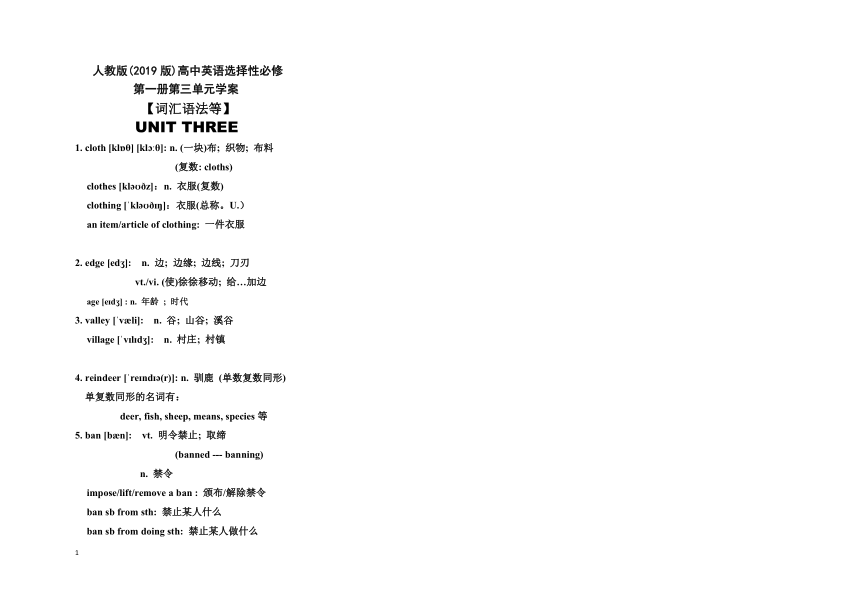
|
|
| 格式 | zip | ||
| 文件大小 | 110.0KB | ||
| 资源类型 | 教案 | ||
| 版本资源 | 人教版(2019) | ||
| 科目 | 英语 | ||
| 更新时间 | 2021-11-19 23:32:57 | ||
图片预览

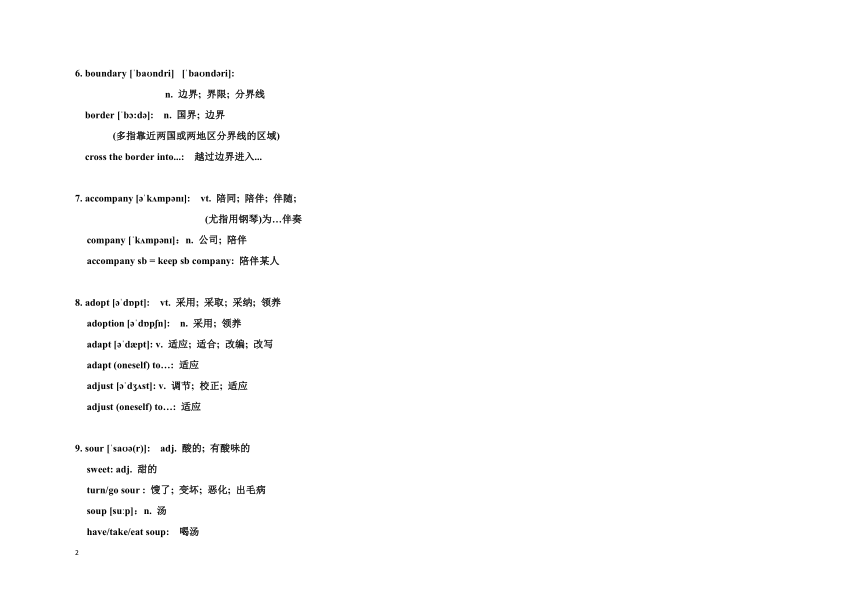
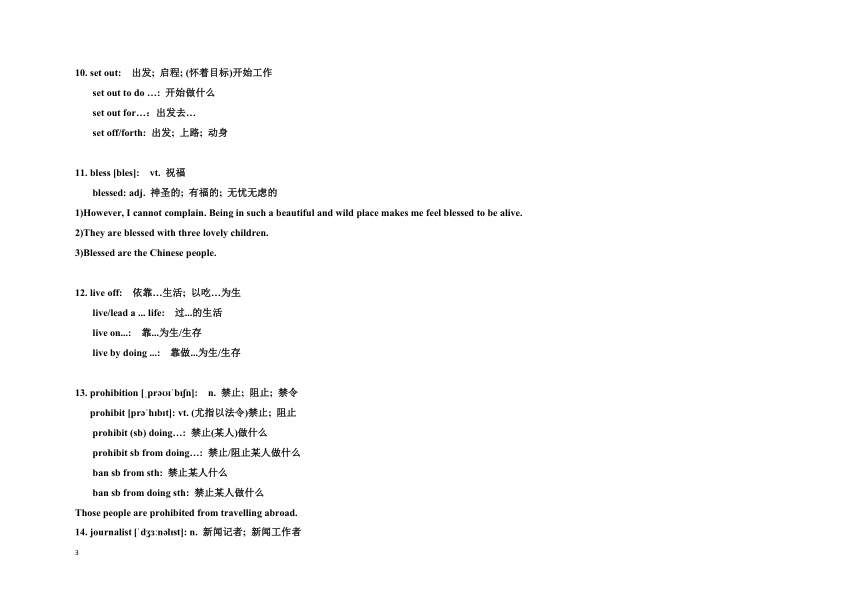
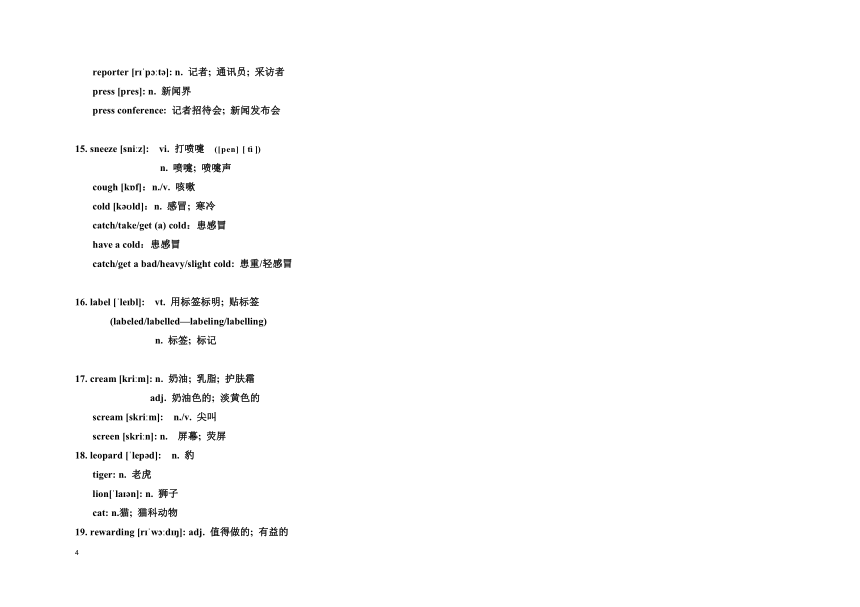
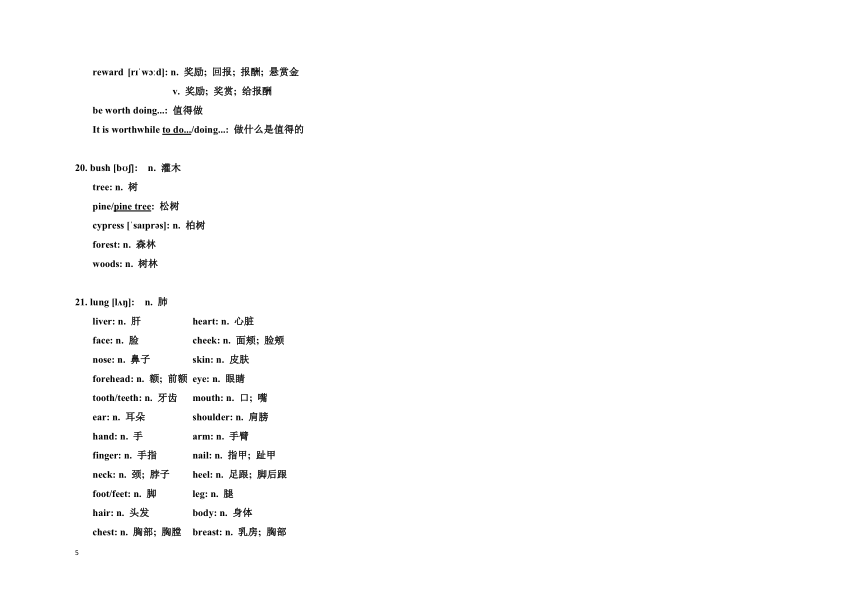
文档简介
人教版(2019版)高中英语选择性必修
第一册第三单元学案
【词汇语法等】
UNIT THREE
1. cloth [kl θ] [kl θ]: n. (一块)布; 织物; 布料
(复数: cloths)
clothes [kl z]:n. 衣服(复数)
clothing [ kl ]:衣服(总称。U.)
an item/article of clothing: 一件衣服
2. edge [ed ]: n. 边; 边缘; 边线; 刀刃
vt./vi. (使)徐徐移动; 给…加边
age [e d ] : n. 年龄 ; 时代
3. valley [ v li]: n. 谷; 山谷; 溪谷
village [ v l d ]: n. 村庄; 村镇
4. reindeer [ re nd (r)]: n. 驯鹿 (单数复数同形)
单复数同形的名词有:
deer, fish, sheep, means, species等
5. ban [b n]: vt. 明令禁止; 取缔
(banned --- banning)
n. 禁令
impose/lift/remove a ban : 颁布/解除禁令
ban sb from sth: 禁止某人什么
ban sb from doing sth: 禁止某人做什么
6. boundary [ ba ndri] [ ba nd ri]:
n. 边界; 界限; 分界线
border [ b :d ]: n. 国界; 边界
(多指靠近两国或两地区分界线的区域)
cross the border into...: 越过边界进入...
7. accompany [ k mp n ]: vt. 陪同; 陪伴; 伴随;
(尤指用钢琴)为…伴奏
company [ k mp n ]:n. 公司; 陪伴
accompany sb = keep sb company: 陪伴某人
8. adopt [ d pt]: vt. 采用; 采取; 采纳; 领养
adoption [ d p n]: n. 采用; 领养
adapt [ d pt]: v. 适应; 适合; 改编; 改写
adapt (oneself) to…: 适应
adjust [ d st]: v. 调节; 校正; 适应
adjust (oneself) to…: 适应
9. sour [ sa (r)]: adj. 酸的; 有酸味的
sweet: adj. 甜的
turn/go sour : 馊了; 变坏; 恶化; 出毛病
soup [su p]:n. 汤
have/take/eat soup: 喝汤
10. set out: 出发; 启程; (怀着目标)开始工作
set out to do …: 开始做什么
set out for…:出发去…
set off/forth: 出发; 上路; 动身
11. bless [bles]: vt. 祝福
blessed: adj. 神圣的; 有福的; 无忧无虑的
1)However, I cannot complain. Being in such a beautiful and wild place makes me feel blessed to be alive.
2)They are blessed with three lovely children.
3)Blessed are the Chinese people.
12. live off: 依靠…生活; 以吃…为生
live/lead a ... life: 过...的生活
live on...: 靠...为生/生存
live by doing ...: 靠做...为生/生存
13. prohibition [ pr b n]: n. 禁止; 阻止; 禁令
prohibit [pr h b t]: vt. (尤指以法令)禁止; 阻止
prohibit (sb) doing…: 禁止(某人)做什么
prohibit sb from doing…: 禁止/阻止某人做什么
ban sb from sth: 禁止某人什么
ban sb from doing sth: 禁止某人做什么
Those people are prohibited from travelling abroad.
14. journalist [ d n l st]: n. 新闻记者; 新闻工作者
reporter [r p t ]: n. 记者; 通讯员; 采访者
press [pres]: n. 新闻界
press conference: 记者招待会; 新闻发布会
15. sneeze [sni z]: vi. 打喷嚏 ([pen] [ tì ])
n. 喷嚏; 喷嚏声
cough [k f]:n./v. 咳嗽
cold [k ld]:n. 感冒; 寒冷
catch/take/get (a) cold:患感冒
have a cold:患感冒
catch/get a bad/heavy/slight cold: 患重/轻感冒
16. label [ le bl]: vt. 用标签标明; 贴标签
(labeled/labelled—labeling/labelling)
n. 标签; 标记
17. cream [kri m]: n. 奶油; 乳脂; 护肤霜
adj. 奶油色的; 淡黄色的
scream [skri m]: n./v. 尖叫
screen [skri n]: n. 屏幕; 荧屏
18. leopard [ lep d]: n. 豹
tiger: n. 老虎
lion[ la n]: n. 狮子
cat: n.猫; 猫科动物
19. rewarding [r w d ]: adj. 值得做的; 有益的
reward [r w d]: n. 奖励; 回报; 报酬; 悬赏金
v. 奖励; 奖赏; 给报酬
be worth doing...: 值得做
It is worthwhile to do.../doing...: 做什么是值得的
20. bush [b ]: n. 灌木
tree: n. 树
pine/pine tree: 松树
cypress [ sa pr s]: n. 柏树
forest: n. 森林
woods: n. 树林
21. lung [l ]: n. 肺
liver: n. 肝 heart: n. 心脏
face: n. 脸 cheek: n. 面颊; 脸颊
nose: n. 鼻子 skin: n. 皮肤
forehead: n. 额; 前额 eye: n. 眼睛
tooth/teeth: n. 牙齿 mouth: n. 口; 嘴
ear: n. 耳朵 shoulder: n. 肩膀
hand: n. 手 arm: n. 手臂
finger: n. 手指 nail: n. 指甲; 趾甲
neck: n. 颈; 脖子 heel: n. 足跟; 脚后跟
foot/feet: n. 脚 leg: n. 腿
hair: n. 头发 body: n. 身体
chest: n. 胸部; 胸膛 breast: n. 乳房; 胸部
back: n. 背 bottom: n. 屁股
head: n. 头; 头脑 mind: n. 头脑; 大脑
muscle: 肌肉; 瘦肉 fat: n. 脂肪; 肥肉
bone: n. 骨头 blood: n. 血
at the top of one’s lung(s)/voice: 大声地
in a low/loud voice: 小声/大声地
22. cycle [ sa kl]: n. 自行车; 摩托车; 循环
v. 骑自行车
bike = bicycle [ ba s kl]: 自行车
motor [ m t ]: n. 摩托车; 汽车
motorcycle ['m t saikl]:n. 摩托车
bus: n. 公共汽车 pickup: 皮卡车
minibus: n. 小型公共汽车
car: n. 小车; 汽车 taxi: n. 出租车
cab: n. 出租车 jeep: n. 吉普车
truck: n. 卡车 train: n. 火车
ship: n. 轮船 boat: n. 小船; 船
plane: n. 飞机 helicopter: n. 直升机
spaceship = spacecraft: n. 宇宙飞船
23. corridor [ k r d (r)]:
n. 狭长地带; 走廊; 过道; 通道
passage [ p s d ]: n. 通道; 走廊; 段落
passenger [ p s nd ]:n. 乘客; 旅客
24. pedal [ pedl]: n. (自行车等的)脚镫子; 踏板
vt./vi. 骑自行车; 踩踏板
(pedaled/pedalled – pedaling/pedalling)
25. fountain [ fa nt n]: n. 喷泉; 人工喷泉; 喷水池
spring: n. 泉; 泉水; 春天
mountain [ ma nt n ] [ ma nt n]: n. 高山; 山脉
26. route [ru t]: n. 路线; 路途; 途径
The Eighth Route Army: 八路军
The New Fourth Army: 新四军
27. ahead [ hed]: adv. 向前; 在前面; 提前
go ahead : 干吧; 进行吧; 继续
ahead of …: 在…前面; 早于; 领先
ahead of time/ schedule: 提前 = in advance
behind schedule/time: 晚点; 误期; 误点
in the days ahead : 在未来的几天
in the weeks/months/years ahead
=in the ... to come: 在未来的几周/月/年
28. theme [θi m]: adj. 有特定主题的
n. 主题; 主题思想
title: n. 题目;标题
topic: n. 题目;话题;论题
theme park: 主题公园; 主题乐园
29. roller coaster [ r l k st (r)]: n. 过山车
ride/take the roller coaster: 坐过山车
get on/off the roller coaster: 上/下过山车
30. incredible [ n kred bl]:
adj. 极好的; 极大的; 难以置信的
unbelievable [, nb li v bl]:
adj. 难以相信的; 不可相信的; 惊人的
It is incredible that ...: 难以置信; 无法相信
It is unbelievable that...: 难以相信; 没法相信
31. appeal [ pi l]: vi. 有吸引力; 呼吁; 恳求; 上诉
n. 吸引力; 呼吁; 上诉; 请求
appear [ p ]:v. 出现; 似乎
appeal to...: 有吸引力; 有感染力;
呼吁; 上诉; 打动
appeal to sb to do...: 呼吁某人做什么
32. pirate [ pa r t]: n. 海盗; 盗版者
vt. 盗印; 窃用
parade [p re d] : n. 游行; 阅兵
private [ pra v t] : adj. 私用的 ;个人的;
私立的; 私营的
fake: n. 假货; 假币; 赝品
33. adorable [ d r bl]: adj. 可爱的; 讨人喜爱的
adore [ d ]:v. 热爱; 爱慕: 崇拜; 喜爱
34. wander [ w nd (r)]: n. 游荡; 闲逛; 流浪
v. 闲逛; 漫游; 走失; 离散; 走神
wonder [ w nd ]:v. 想知道; 琢磨; 怀疑
wander in/at/on/around...: 在...徘徊/游荡/漫游
35. amusement [ mju zm nt]: n. 娱乐(活动); 愉悦
amuse [ mju z]: v. 使开心/愉快/发笑; 逗笑; 逗乐
amuse oneself (by) doing...: 以...自娱
amused : adj. 愉快的; 开心的;
逗乐的; 觉得好笑的
amusing: adj. 有趣的;好玩的;引人发笑的;
令人开心的/愉快的
be amused at/by/with...: 因...而乐
an amusement park: 游乐场
to one’s amusement: 使某人高兴的是
36. enormous [ n m s]: adj. 巨大的; 极大的
(指尺寸或数量巨大的)
huge [hju d ]: adj. 巨大的; 庞大的
(指体积、数量、程度方面极大的)
giant [ d a nt]: adj. 巨大的; 庞大的
(只作定语,指比其他同类事物大的)
vast [vɑ st]: adj. 巨大的;广阔的;浩瀚的
(多指空间、面积、范围巨大的)
big: adj. 大的;巨大的(体积、程度、数量等)
large: adj. 大的;大规模的;大量的; 大型号的
(主要用于形容面积、体积、数量、
重量; 指人时表示身材高大的)
great: adj. 伟大的; 大的; 巨大的;
数量大的; 众多的
(体积、尺寸、程度等大于一般的)
37. iron [ a n]: n. 铁; 铁器; 铸铁; 熨斗
v.(用熨斗)熨; 烫平
metal: n. 金属 steel: n. 钢
gold: n. 黄金 silver: n. 银
bronze: n. 铜 lead: n. 铅
an iron and steel works: 钢铁厂
electric/steam iron: 电熨斗/蒸汽熨斗
38. fashion [ f n]: n. 时尚; 时兴; 流行款式
the world of fashion: 时装界
the fashion industry: 时装业
a fashion show: 时装表演
(be) in fashion: 流行
(be) out of fashion: 不流行; 过时
come into fashion: 流行
go out of fashion: 不流行; 过时
39. rare [re (r)]: adj. 稀少的; 珍贵的; (肉)半熟的
It's rare for sb to do...: 某人难得/很少做什么
40. superb [su p b]: adj. 极佳的; 卓越的
super [ su p ]: adj. 超级的; 极好的;了不起的
outstanding [a t st nd ]:
adj. 优秀的; 杰出的; 重要的
excellent [ eks l nt]:adj. 优秀的; 很好的; 好极了
brilliant [ br lj nt]: adj. 极棒的; 极为成功的
supper [ s p ]: n. 晚饭
41. aquarium [ kwe ri m]:
n. 水族馆; 水族玻璃槽; 养鱼缸
(复数: aquariums /aquaria [ 'kwe ri ])
42. up to...: 多达; 达到(某数量、程度等); 直到;
不多于; (体力或智力上)能胜任
It is up to you. 由你决定。
It is up to sb to do...: 做...由某人决定;
做...是某人的职责/责任
What are you up to 你在做什么 你在忙些什么
1)Here you can walk under the Whale Shark Aquarium-----the world's largest-----and see up to 20, 000 fish, in addition to a whale shark 68 metres in length.
2)You can write up to five key words on the card.
3)I will read up to page 60.
4)Up to 200 students admitted that they played on the phones last night.
5) In my opinion, he is (not) up to the work/job/task.
6) My English really isn't up to the work. I do apologize.
43. polar [ p l (r)]: adj. (近)极地的;
南极(或北极)的; 磁极的
pole [p l]:n. 竿; 柱; 极
The North/South Pole: 北/南极
44. upside down: 颠倒; 倒转; 翻转 [ psa d]
turn…upside down: 把…倒过来
stand on end: 竖起来; 立起来
45. display [d sple ]: n. 展览; 陈列; 展览品
vt. 显示; 陈列
on display/show: 陈列; 展出
46. appetite [ p ta t]: n. 食欲; 胃口; 强烈欲望
have a good/poor appetite: 胃口好/差
have no appetite: 没有胃口/食欲
lose one’s appetite: 没有胃口/食欲
have an appetite for ...: 有强烈欲望
47. entertainment [ ent te nm nt]:
n. 娱乐; 招待; 娱乐活动; 文娱节目
(指娱乐节目或活动,如电影、电视、
文艺表演等)
amusement: n. 娱乐; 消遣
(指因事物搞笑而感到的开心,
或为打发时间而进行的娱乐活动)
e to mind: 突然想起/记起
come up with...: 提出; 想出; 找到(答案); 拿出(钱)
1)When I was sweeping the floor, three things immediately came to mind.
2)I came up with a new solution to the problem.
49. wake up to...: 因...而醒来; 认识到; 意识到
50. set = go down= sink: 落下
rise: 升起
1)The sun/moon sets in the west.
2)The sun/moon rises in the east.
51. be covered with/by...:被…覆盖
52. leave behind...: 留下; 忘了带...; 离开
53. soon after: 不久后
54.apart from...: 除...外 (包含或者不包含)
1)So apart from the Sami very few people have ever seen Sarek.
2)Apart from his salary, he also has a private income.
3)All my students like music apart from Jack.
55. way of life/living: 生活方式
56. live/lead a ... life: 过...的生活
57. a number of (+ 复数名): 许多
a small number of (+ 复数名): 少量
the number of: …的数字
58. bring/take/carry…with sb: 携带
59.( be) anything like...: 和...相像/相似
1)If today is anything like yesterday, it will be full of sweat and hard work.
2)Do you look anything like your father
60. the Swedish/Chinese government: 瑞典/中国政府
61. be known to sb: 被…知道/熟知
be known for..: 因…而闻名
be known as...: 作为…而闻名
That village is unkown to the outside world.
62. be home to ...: ...是...的家园/栖息地
1)Sarek’s mountains are home to the Sami.
2)Sichuan and Shaanxi are home to pandas.
3)India is the home of tigers.
63. as it is /was : 照/按原样
as they are /were: 照/按原样
We hope that the national park will always remain as it is.
64. 倍数的三种表示法:
A.…twice/three times + 比较级 + than…:
......比.....两倍/三倍
This railway is twice longer than that one.
B. …twice/three times as…as…: .....是....两倍/三倍
Asia is four times as large as Europe.
C.…twice/four times the height of …:
......是.....高度(...)的两倍/四倍
【weight, width, depth, length, size, amount, age…】
This bridge is twice the width of the one over the
River Thames.
65. be famous for…: 因…闻名
66. be familiar with…: 对…熟悉
67. put on performances: 演出
68. all (the) year round: 全年
69. a treat: 棒极了
70. A. ...be thought to be …….: 被认为...
B. ...be thought to live/like/know…:
被认为住/喜欢/知道
C. ...be thought to be doing….…….:
被认为正在做什么
D. ...be thought to have done…….:
被认为做了什么
【said, believed, considered, supposed, expected,
reported, known也可这样用】
1)The area is thought to have about 35 tigers and 70
leopards.
2)The man is thought to be a doctor.
3)The woman is thought to know his address.
4)Your brother is thought to be playing games.
5)Her sister is thought to have left China.
71. put...in place: 实施; 落实到位
72. fit into...: 使...适合于...
73. take photos/pictures (of...):照相
74. be/get close to…:靠近
75. more than: 非常; 超过; 胜过; 不仅仅
76. have fun = enjoy oneself = have a good time:
玩舒服; 尽情地玩
77. in addition to + 名词/代词/doing...:
除了...外(还)
1)In addition to English, the journalist has to study a second foreign language.
2)They play football in addition to basketball.
3)In addition to giving me some advice, the farmer gave me some money.
78. work/ act/serve as...: 担任
I have worked as a guide for more than 10 years.
79. 本单元语法:
doing/being结构作主语
此结构作主语, 通常接单数动词。
1)Getting there is quite difficult.
2)Being in such a beautiful and wild place makes me feel blessed to be alive.
3)Studying abroad is both challenging and rewarding.
4)Going on a hiking tour in Sarek in winter
would hardly be possible due to the extreme cold.
5)Honestly, exploring a vast unknown land
can be both exciting and terrifying.
6)Adopting a positive attitude is good, even when
things are difficult
7)Hiring local guides is strongly advised, because they can offer accurate knowledge of Sarek culture and history.
8)For hundreds of years, looking after reindeer was
a way of life for the Sami.
9)Travelling through space, visiting a pirate ship, or meeting an adorable fairytale or cartoon character are all possible at Disneyland.
10)Visiting the candy shop and trying some of the same kind of candy that American southerners made 150 years ago is a rare experience.
11)Riding on the only steam engine still working in the southeastern United States is a special treat.
12)Watching the dolphin and sea lion shows
is both educational and fun.
13)Reading English aloud in the morning will do you lots of good.
14)Since then, finding ways to grow more rice has been his life goal.
15)Being a good person is too difficult for him.
16)Being examined twice a year is the rule that every driver shall obey in this city.
★特别注意:doing结构可以作主语, to不定式也可以
作主语, 区别在于:
①表示比较抽象的一般行为或者经常性习惯性的动
作时, 多用doing作主语。
②表示具体的某次动作, 特别是将来发生的动作, 多用不定式作主语。不定式作主语, 后接单数动词。
1)To take a trip is not a wise choice on the National
Day this year.
2)To hold a party this evening makes us happy.
- 1 -
第一册第三单元学案
【词汇语法等】
UNIT THREE
1. cloth [kl θ] [kl θ]: n. (一块)布; 织物; 布料
(复数: cloths)
clothes [kl z]:n. 衣服(复数)
clothing [ kl ]:衣服(总称。U.)
an item/article of clothing: 一件衣服
2. edge [ed ]: n. 边; 边缘; 边线; 刀刃
vt./vi. (使)徐徐移动; 给…加边
age [e d ] : n. 年龄 ; 时代
3. valley [ v li]: n. 谷; 山谷; 溪谷
village [ v l d ]: n. 村庄; 村镇
4. reindeer [ re nd (r)]: n. 驯鹿 (单数复数同形)
单复数同形的名词有:
deer, fish, sheep, means, species等
5. ban [b n]: vt. 明令禁止; 取缔
(banned --- banning)
n. 禁令
impose/lift/remove a ban : 颁布/解除禁令
ban sb from sth: 禁止某人什么
ban sb from doing sth: 禁止某人做什么
6. boundary [ ba ndri] [ ba nd ri]:
n. 边界; 界限; 分界线
border [ b :d ]: n. 国界; 边界
(多指靠近两国或两地区分界线的区域)
cross the border into...: 越过边界进入...
7. accompany [ k mp n ]: vt. 陪同; 陪伴; 伴随;
(尤指用钢琴)为…伴奏
company [ k mp n ]:n. 公司; 陪伴
accompany sb = keep sb company: 陪伴某人
8. adopt [ d pt]: vt. 采用; 采取; 采纳; 领养
adoption [ d p n]: n. 采用; 领养
adapt [ d pt]: v. 适应; 适合; 改编; 改写
adapt (oneself) to…: 适应
adjust [ d st]: v. 调节; 校正; 适应
adjust (oneself) to…: 适应
9. sour [ sa (r)]: adj. 酸的; 有酸味的
sweet: adj. 甜的
turn/go sour : 馊了; 变坏; 恶化; 出毛病
soup [su p]:n. 汤
have/take/eat soup: 喝汤
10. set out: 出发; 启程; (怀着目标)开始工作
set out to do …: 开始做什么
set out for…:出发去…
set off/forth: 出发; 上路; 动身
11. bless [bles]: vt. 祝福
blessed: adj. 神圣的; 有福的; 无忧无虑的
1)However, I cannot complain. Being in such a beautiful and wild place makes me feel blessed to be alive.
2)They are blessed with three lovely children.
3)Blessed are the Chinese people.
12. live off: 依靠…生活; 以吃…为生
live/lead a ... life: 过...的生活
live on...: 靠...为生/生存
live by doing ...: 靠做...为生/生存
13. prohibition [ pr b n]: n. 禁止; 阻止; 禁令
prohibit [pr h b t]: vt. (尤指以法令)禁止; 阻止
prohibit (sb) doing…: 禁止(某人)做什么
prohibit sb from doing…: 禁止/阻止某人做什么
ban sb from sth: 禁止某人什么
ban sb from doing sth: 禁止某人做什么
Those people are prohibited from travelling abroad.
14. journalist [ d n l st]: n. 新闻记者; 新闻工作者
reporter [r p t ]: n. 记者; 通讯员; 采访者
press [pres]: n. 新闻界
press conference: 记者招待会; 新闻发布会
15. sneeze [sni z]: vi. 打喷嚏 ([pen] [ tì ])
n. 喷嚏; 喷嚏声
cough [k f]:n./v. 咳嗽
cold [k ld]:n. 感冒; 寒冷
catch/take/get (a) cold:患感冒
have a cold:患感冒
catch/get a bad/heavy/slight cold: 患重/轻感冒
16. label [ le bl]: vt. 用标签标明; 贴标签
(labeled/labelled—labeling/labelling)
n. 标签; 标记
17. cream [kri m]: n. 奶油; 乳脂; 护肤霜
adj. 奶油色的; 淡黄色的
scream [skri m]: n./v. 尖叫
screen [skri n]: n. 屏幕; 荧屏
18. leopard [ lep d]: n. 豹
tiger: n. 老虎
lion[ la n]: n. 狮子
cat: n.猫; 猫科动物
19. rewarding [r w d ]: adj. 值得做的; 有益的
reward [r w d]: n. 奖励; 回报; 报酬; 悬赏金
v. 奖励; 奖赏; 给报酬
be worth doing...: 值得做
It is worthwhile to do.../doing...: 做什么是值得的
20. bush [b ]: n. 灌木
tree: n. 树
pine/pine tree: 松树
cypress [ sa pr s]: n. 柏树
forest: n. 森林
woods: n. 树林
21. lung [l ]: n. 肺
liver: n. 肝 heart: n. 心脏
face: n. 脸 cheek: n. 面颊; 脸颊
nose: n. 鼻子 skin: n. 皮肤
forehead: n. 额; 前额 eye: n. 眼睛
tooth/teeth: n. 牙齿 mouth: n. 口; 嘴
ear: n. 耳朵 shoulder: n. 肩膀
hand: n. 手 arm: n. 手臂
finger: n. 手指 nail: n. 指甲; 趾甲
neck: n. 颈; 脖子 heel: n. 足跟; 脚后跟
foot/feet: n. 脚 leg: n. 腿
hair: n. 头发 body: n. 身体
chest: n. 胸部; 胸膛 breast: n. 乳房; 胸部
back: n. 背 bottom: n. 屁股
head: n. 头; 头脑 mind: n. 头脑; 大脑
muscle: 肌肉; 瘦肉 fat: n. 脂肪; 肥肉
bone: n. 骨头 blood: n. 血
at the top of one’s lung(s)/voice: 大声地
in a low/loud voice: 小声/大声地
22. cycle [ sa kl]: n. 自行车; 摩托车; 循环
v. 骑自行车
bike = bicycle [ ba s kl]: 自行车
motor [ m t ]: n. 摩托车; 汽车
motorcycle ['m t saikl]:n. 摩托车
bus: n. 公共汽车 pickup: 皮卡车
minibus: n. 小型公共汽车
car: n. 小车; 汽车 taxi: n. 出租车
cab: n. 出租车 jeep: n. 吉普车
truck: n. 卡车 train: n. 火车
ship: n. 轮船 boat: n. 小船; 船
plane: n. 飞机 helicopter: n. 直升机
spaceship = spacecraft: n. 宇宙飞船
23. corridor [ k r d (r)]:
n. 狭长地带; 走廊; 过道; 通道
passage [ p s d ]: n. 通道; 走廊; 段落
passenger [ p s nd ]:n. 乘客; 旅客
24. pedal [ pedl]: n. (自行车等的)脚镫子; 踏板
vt./vi. 骑自行车; 踩踏板
(pedaled/pedalled – pedaling/pedalling)
25. fountain [ fa nt n]: n. 喷泉; 人工喷泉; 喷水池
spring: n. 泉; 泉水; 春天
mountain [ ma nt n ] [ ma nt n]: n. 高山; 山脉
26. route [ru t]: n. 路线; 路途; 途径
The Eighth Route Army: 八路军
The New Fourth Army: 新四军
27. ahead [ hed]: adv. 向前; 在前面; 提前
go ahead : 干吧; 进行吧; 继续
ahead of …: 在…前面; 早于; 领先
ahead of time/ schedule: 提前 = in advance
behind schedule/time: 晚点; 误期; 误点
in the days ahead : 在未来的几天
in the weeks/months/years ahead
=in the ... to come: 在未来的几周/月/年
28. theme [θi m]: adj. 有特定主题的
n. 主题; 主题思想
title: n. 题目;标题
topic: n. 题目;话题;论题
theme park: 主题公园; 主题乐园
29. roller coaster [ r l k st (r)]: n. 过山车
ride/take the roller coaster: 坐过山车
get on/off the roller coaster: 上/下过山车
30. incredible [ n kred bl]:
adj. 极好的; 极大的; 难以置信的
unbelievable [, nb li v bl]:
adj. 难以相信的; 不可相信的; 惊人的
It is incredible that ...: 难以置信; 无法相信
It is unbelievable that...: 难以相信; 没法相信
31. appeal [ pi l]: vi. 有吸引力; 呼吁; 恳求; 上诉
n. 吸引力; 呼吁; 上诉; 请求
appear [ p ]:v. 出现; 似乎
appeal to...: 有吸引力; 有感染力;
呼吁; 上诉; 打动
appeal to sb to do...: 呼吁某人做什么
32. pirate [ pa r t]: n. 海盗; 盗版者
vt. 盗印; 窃用
parade [p re d] : n. 游行; 阅兵
private [ pra v t] : adj. 私用的 ;个人的;
私立的; 私营的
fake: n. 假货; 假币; 赝品
33. adorable [ d r bl]: adj. 可爱的; 讨人喜爱的
adore [ d ]:v. 热爱; 爱慕: 崇拜; 喜爱
34. wander [ w nd (r)]: n. 游荡; 闲逛; 流浪
v. 闲逛; 漫游; 走失; 离散; 走神
wonder [ w nd ]:v. 想知道; 琢磨; 怀疑
wander in/at/on/around...: 在...徘徊/游荡/漫游
35. amusement [ mju zm nt]: n. 娱乐(活动); 愉悦
amuse [ mju z]: v. 使开心/愉快/发笑; 逗笑; 逗乐
amuse oneself (by) doing...: 以...自娱
amused : adj. 愉快的; 开心的;
逗乐的; 觉得好笑的
amusing: adj. 有趣的;好玩的;引人发笑的;
令人开心的/愉快的
be amused at/by/with...: 因...而乐
an amusement park: 游乐场
to one’s amusement: 使某人高兴的是
36. enormous [ n m s]: adj. 巨大的; 极大的
(指尺寸或数量巨大的)
huge [hju d ]: adj. 巨大的; 庞大的
(指体积、数量、程度方面极大的)
giant [ d a nt]: adj. 巨大的; 庞大的
(只作定语,指比其他同类事物大的)
vast [vɑ st]: adj. 巨大的;广阔的;浩瀚的
(多指空间、面积、范围巨大的)
big: adj. 大的;巨大的(体积、程度、数量等)
large: adj. 大的;大规模的;大量的; 大型号的
(主要用于形容面积、体积、数量、
重量; 指人时表示身材高大的)
great: adj. 伟大的; 大的; 巨大的;
数量大的; 众多的
(体积、尺寸、程度等大于一般的)
37. iron [ a n]: n. 铁; 铁器; 铸铁; 熨斗
v.(用熨斗)熨; 烫平
metal: n. 金属 steel: n. 钢
gold: n. 黄金 silver: n. 银
bronze: n. 铜 lead: n. 铅
an iron and steel works: 钢铁厂
electric/steam iron: 电熨斗/蒸汽熨斗
38. fashion [ f n]: n. 时尚; 时兴; 流行款式
the world of fashion: 时装界
the fashion industry: 时装业
a fashion show: 时装表演
(be) in fashion: 流行
(be) out of fashion: 不流行; 过时
come into fashion: 流行
go out of fashion: 不流行; 过时
39. rare [re (r)]: adj. 稀少的; 珍贵的; (肉)半熟的
It's rare for sb to do...: 某人难得/很少做什么
40. superb [su p b]: adj. 极佳的; 卓越的
super [ su p ]: adj. 超级的; 极好的;了不起的
outstanding [a t st nd ]:
adj. 优秀的; 杰出的; 重要的
excellent [ eks l nt]:adj. 优秀的; 很好的; 好极了
brilliant [ br lj nt]: adj. 极棒的; 极为成功的
supper [ s p ]: n. 晚饭
41. aquarium [ kwe ri m]:
n. 水族馆; 水族玻璃槽; 养鱼缸
(复数: aquariums /aquaria [ 'kwe ri ])
42. up to...: 多达; 达到(某数量、程度等); 直到;
不多于; (体力或智力上)能胜任
It is up to you. 由你决定。
It is up to sb to do...: 做...由某人决定;
做...是某人的职责/责任
What are you up to 你在做什么 你在忙些什么
1)Here you can walk under the Whale Shark Aquarium-----the world's largest-----and see up to 20, 000 fish, in addition to a whale shark 68 metres in length.
2)You can write up to five key words on the card.
3)I will read up to page 60.
4)Up to 200 students admitted that they played on the phones last night.
5) In my opinion, he is (not) up to the work/job/task.
6) My English really isn't up to the work. I do apologize.
43. polar [ p l (r)]: adj. (近)极地的;
南极(或北极)的; 磁极的
pole [p l]:n. 竿; 柱; 极
The North/South Pole: 北/南极
44. upside down: 颠倒; 倒转; 翻转 [ psa d]
turn…upside down: 把…倒过来
stand on end: 竖起来; 立起来
45. display [d sple ]: n. 展览; 陈列; 展览品
vt. 显示; 陈列
on display/show: 陈列; 展出
46. appetite [ p ta t]: n. 食欲; 胃口; 强烈欲望
have a good/poor appetite: 胃口好/差
have no appetite: 没有胃口/食欲
lose one’s appetite: 没有胃口/食欲
have an appetite for ...: 有强烈欲望
47. entertainment [ ent te nm nt]:
n. 娱乐; 招待; 娱乐活动; 文娱节目
(指娱乐节目或活动,如电影、电视、
文艺表演等)
amusement: n. 娱乐; 消遣
(指因事物搞笑而感到的开心,
或为打发时间而进行的娱乐活动)
e to mind: 突然想起/记起
come up with...: 提出; 想出; 找到(答案); 拿出(钱)
1)When I was sweeping the floor, three things immediately came to mind.
2)I came up with a new solution to the problem.
49. wake up to...: 因...而醒来; 认识到; 意识到
50. set = go down= sink: 落下
rise: 升起
1)The sun/moon sets in the west.
2)The sun/moon rises in the east.
51. be covered with/by...:被…覆盖
52. leave behind...: 留下; 忘了带...; 离开
53. soon after: 不久后
54.apart from...: 除...外 (包含或者不包含)
1)So apart from the Sami very few people have ever seen Sarek.
2)Apart from his salary, he also has a private income.
3)All my students like music apart from Jack.
55. way of life/living: 生活方式
56. live/lead a ... life: 过...的生活
57. a number of (+ 复数名): 许多
a small number of (+ 复数名): 少量
the number of: …的数字
58. bring/take/carry…with sb: 携带
59.( be) anything like...: 和...相像/相似
1)If today is anything like yesterday, it will be full of sweat and hard work.
2)Do you look anything like your father
60. the Swedish/Chinese government: 瑞典/中国政府
61. be known to sb: 被…知道/熟知
be known for..: 因…而闻名
be known as...: 作为…而闻名
That village is unkown to the outside world.
62. be home to ...: ...是...的家园/栖息地
1)Sarek’s mountains are home to the Sami.
2)Sichuan and Shaanxi are home to pandas.
3)India is the home of tigers.
63. as it is /was : 照/按原样
as they are /were: 照/按原样
We hope that the national park will always remain as it is.
64. 倍数的三种表示法:
A.…twice/three times + 比较级 + than…:
......比.....两倍/三倍
This railway is twice longer than that one.
B. …twice/three times as…as…: .....是....两倍/三倍
Asia is four times as large as Europe.
C.…twice/four times the height of …:
......是.....高度(...)的两倍/四倍
【weight, width, depth, length, size, amount, age…】
This bridge is twice the width of the one over the
River Thames.
65. be famous for…: 因…闻名
66. be familiar with…: 对…熟悉
67. put on performances: 演出
68. all (the) year round: 全年
69. a treat: 棒极了
70. A. ...be thought to be …….: 被认为...
B. ...be thought to live/like/know…:
被认为住/喜欢/知道
C. ...be thought to be doing….…….:
被认为正在做什么
D. ...be thought to have done…….:
被认为做了什么
【said, believed, considered, supposed, expected,
reported, known也可这样用】
1)The area is thought to have about 35 tigers and 70
leopards.
2)The man is thought to be a doctor.
3)The woman is thought to know his address.
4)Your brother is thought to be playing games.
5)Her sister is thought to have left China.
71. put...in place: 实施; 落实到位
72. fit into...: 使...适合于...
73. take photos/pictures (of...):照相
74. be/get close to…:靠近
75. more than: 非常; 超过; 胜过; 不仅仅
76. have fun = enjoy oneself = have a good time:
玩舒服; 尽情地玩
77. in addition to + 名词/代词/doing...:
除了...外(还)
1)In addition to English, the journalist has to study a second foreign language.
2)They play football in addition to basketball.
3)In addition to giving me some advice, the farmer gave me some money.
78. work/ act/serve as...: 担任
I have worked as a guide for more than 10 years.
79. 本单元语法:
doing/being结构作主语
此结构作主语, 通常接单数动词。
1)Getting there is quite difficult.
2)Being in such a beautiful and wild place makes me feel blessed to be alive.
3)Studying abroad is both challenging and rewarding.
4)Going on a hiking tour in Sarek in winter
would hardly be possible due to the extreme cold.
5)Honestly, exploring a vast unknown land
can be both exciting and terrifying.
6)Adopting a positive attitude is good, even when
things are difficult
7)Hiring local guides is strongly advised, because they can offer accurate knowledge of Sarek culture and history.
8)For hundreds of years, looking after reindeer was
a way of life for the Sami.
9)Travelling through space, visiting a pirate ship, or meeting an adorable fairytale or cartoon character are all possible at Disneyland.
10)Visiting the candy shop and trying some of the same kind of candy that American southerners made 150 years ago is a rare experience.
11)Riding on the only steam engine still working in the southeastern United States is a special treat.
12)Watching the dolphin and sea lion shows
is both educational and fun.
13)Reading English aloud in the morning will do you lots of good.
14)Since then, finding ways to grow more rice has been his life goal.
15)Being a good person is too difficult for him.
16)Being examined twice a year is the rule that every driver shall obey in this city.
★特别注意:doing结构可以作主语, to不定式也可以
作主语, 区别在于:
①表示比较抽象的一般行为或者经常性习惯性的动
作时, 多用doing作主语。
②表示具体的某次动作, 特别是将来发生的动作, 多用不定式作主语。不定式作主语, 后接单数动词。
1)To take a trip is not a wise choice on the National
Day this year.
2)To hold a party this evening makes us happy.
- 1 -
